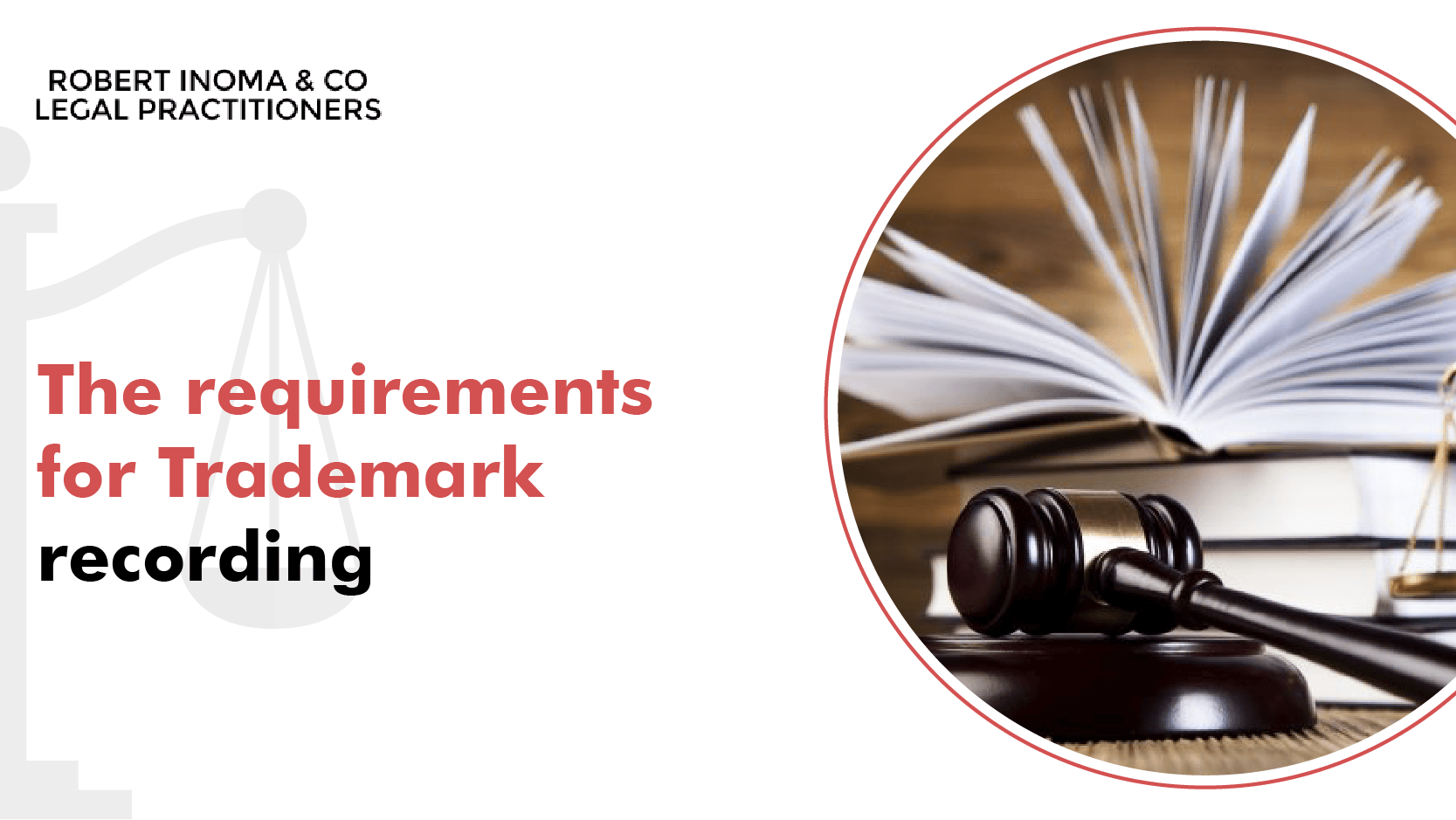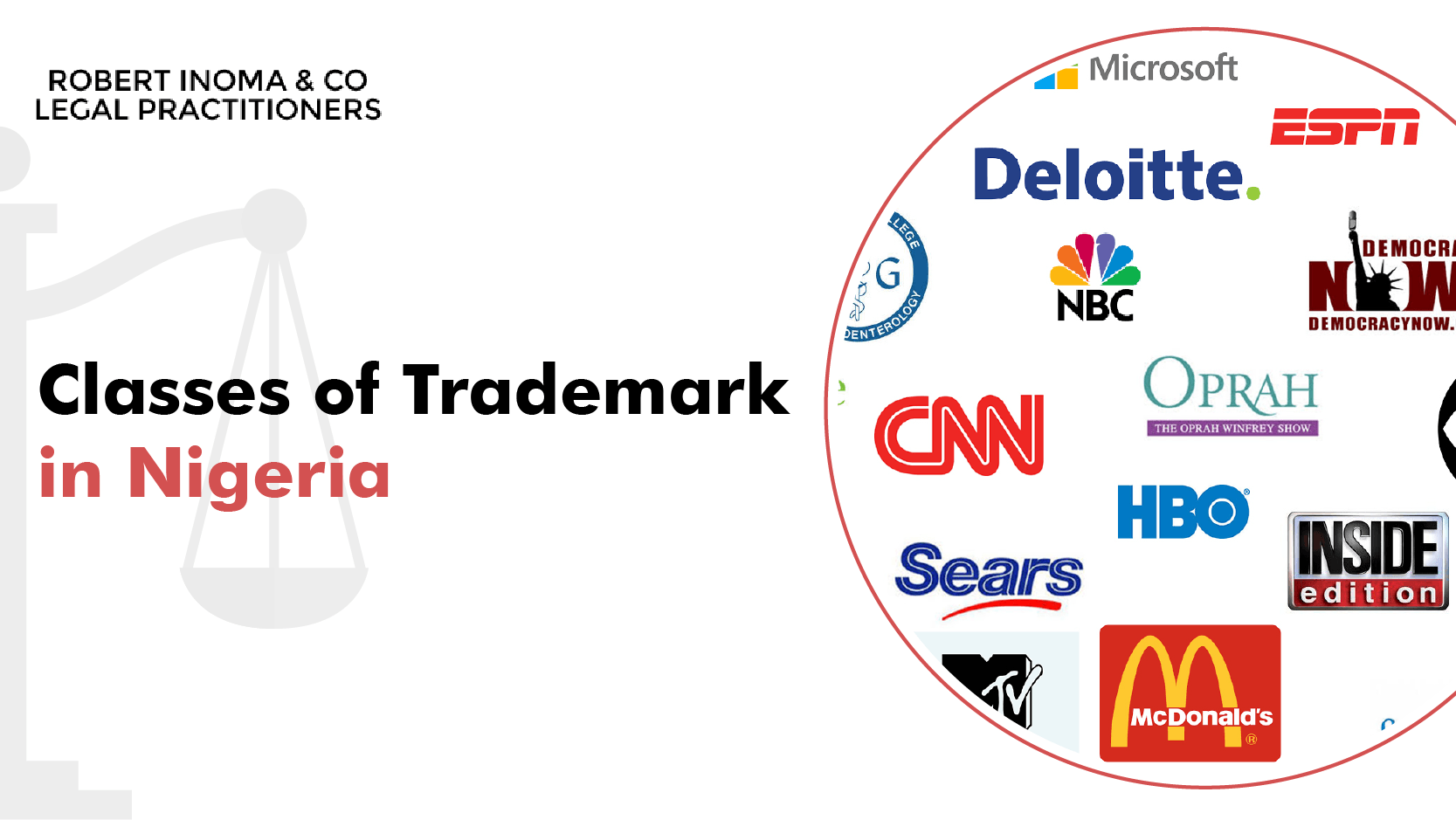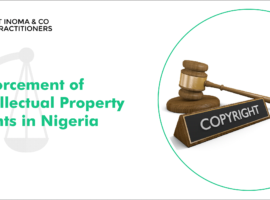Trademark Registration in Nigeria: Procedure & Requirements
Trademark differentiates the products of an enterprise from others. Trademark is an intellectual property that has a recognizable sign or expression that identifies a product or service and distinguishes it from others. They are protected by the intellectual property rights under the Nigeria Trade Mark Act.
Trademark has numerous benefits including, giving the owner exclusive right to the product, recognition, and trust from the general audience, protection against infringements, and lots more. There are three (3) different types of trademarks in Nigeria that can be registered; a word
Before a product or service can be trademarked in Nigeria, some different requirements and procedures have to be in place. The name of the company or individual, the applicant’s signature, and a copy of the invention, are vital requirements for a trademark procedure.
Contents
Registration of Trademark in Nigeria
Trademark is registered at the Trademark, Patents and Designs Registry, Commercial Law Department, Federal Ministry of Industry, Trade, and Investment in Nigeria. According to the Nigerian law, Trademark can only be registered by only accredited individuals/companies like Robert Inoma law firm. Before you can register trademarks you first need to hire an accredited trademark agent. Here is the process for registration of a trademark in Nigeria:
Trademark Search
The process begins with a search on the trademark mark to ensure that the mark does not already exist or infringe on an existing one. The search is conducted to determine if there are any registered marks that are similar to the proposed mark. The result of this search strongly determines if a mark can be registered or not.
Application
When there are no similar marks, registration can begin. If the mark is seen as registrable, it will be presented for filing to the Registry. The Trademark Registry would acknowledge its filling with an acknowledgment letter. Subsequently, an acceptance letter, which serves as an approval, would be issued by the registry, and the mark will be published in the quarterly Trademark Journal by the Trademarks Office.
Trademark Certificate
After the proposed mark has been published in the Trademark Journal, any interested party can oppose its registration within 2 months of its publication. If it is not opposed within two (2) months, you can then apply for the Trademark Certificate at Trademark Registrar. Upon application, the registrar will check for objections received, and if no valid objection has been received, the certificate of trademark registration will be issued to the applicant. The Trademark Certificate will reflect the date of its filing as the date of registration.
Trademark registration in Nigeria is renewed initially after 7 years then subsequently renewable after 14 years. Application for its renewal should be made not less than three (3) months from its due date to avoid loss of the trademark.
The applicant can register a mark in black and white or in color. However, it is more advisable to register a trademark in black and white, because when a trademark is registered in color, the protection is limited to only the indicated color. Whereas, when it is registered in black and white, the protection covers all colors of the trademarked item.
Requirements for Trademark Registration in Nigeria
What are the Requirements for Trademark Registration in Nigeria?
Before a trademark can be processed or registered, there are a few requirements that need to be provided such as:
- The name of the company or individual (Applicant’s details)
- Contact details (phone number, email address, company address)
- Power of attorney appointing the trademark agent. (This will be drafted by your trademark agent)
- A copy of item proposed for trademarking (a device, logo, word or words)
- Signature or Company seal
Why Register a Trademark In Nigeria?

Registering a trademark has its benefits, especially for business owners in Nigeria and all foreign products in the Nigerian market. Once a trademark is registered, the trademark owner can take legal actions against anyone who infringes on it by using or selling it without permission. The trademark item will become an asset to the owner.
Trademarked items also carry the symbol ® next to the brand to warn people against infringement and show ownership. Brands that carry the trademarked symbol are usually trusted more than others because only legitimate and original items can be trademarked. They help give a brand a positive reputation for the quality of its products.
The only way to have the exclusive right to a mark is by registering it for a trademark. Not registering a trademark will mean that anybody can use your mark and you cannot take any action against them. It is then imperative to register for a trademark in Nigeria.
In the Nigerian constitution, there is a Trade Marks Act that governs trademarks. The Trademarks, Patents And Designs Registry, Commercial Law Department, Federal Ministry Of Industry, Trade And Investment is the governmental body that supervises trademarks. A registered trademark is protected and those who infringe on it can be sued.
Registering a trademark in Nigeria also gives a trademark preference for registration in other countries. In other words, it will become easier to obtain an international trademark when you have a trademark in Nigeria. Although no signed treaty makes a trademark registered in Nigeria automatically registered in other countries, registering a trademark in Nigeria gives it preference in other countries.
In certain sectors, a trademark is a requirement to obtain the operation of license in Nigeria. Trademarks can also be renewed from time to time, without limits of renewal. These are only a few reasons why you need to register a trademark in Nigeria.
What Can Be Trademarked?
A brand, device, name, heading, word, label, ticket, symbol, signature, letter, or color are eligible for a trademark. It however has to be used commercially for it to be protected by law.
For a trademark to be registered in Nigeria it should have the following essentials:
- A distinctive mark
- The name of a company or individual represented
- Signature of the applicant
- An invention
A slogan, name, domain name, shape, and logo can also be trademarked.
Types Of Trademark
Three types of marks can be trademarked
1. Trademarks and Service Marks
These are phrases, words, or symbols that describe a company’s goods or services that can be trademarked. A service mark will be issued for services while a trademark will be issued for goods.
2. Collective Marks
Collective marks are just like trademarks, except that they can be identified with a group. Members of a group can use and make profit with a single trademark.
3. Certification Marks
Certification marks protect the features of a product. It shows consumers that certain goods or services have met a standard. For example, a company can have a certification mark that proves it has 100% cotton materials in its goods.
Hard Trademarks to Register
Certain trademarks can be hard to register if it falls under the following categories:
- Generic names
- Surnames of a product
- Geographic location
- Names that can’t be distinguished from other products
Although Trademark grants protection, it doesn’t give a company monopoly over its use. For example, because Nike’s slogan ‘Just Do it” registered, does not mean it cannot be said in a movie or a completely different industry from Nike.
Life Cycle of a Trademark
Once a trademark is registered, it does not last forever, it has to be renewed from time to time. Trademarks have a consistent life cycle. It has four stages:
- Creation: Trademark begins with the selection of a trademark or service(the item you want to be trademarked)
- Screening and Clearance: The proposed mark will undergo a trademark search to ensure its availability.
- Approval and Publication: The proposed mark will be approved if it meets its requirements and published in the trademark journal
- Maintenance and renewal: After an initial 7 years, it will be renewed. Subsequently, it has to be renewed every 14 years. To maintain a trademark, you need to continuously follow these processes.
Trademark registration in Nigeria is a vital way to protect and distinguish one’s trade symbol or business in Nigeria from others. It is the only way to protect a unique symbol or brand in Nigeria. Unauthorized use of a registered trademark can be punished by law.
Trademark Recording
A registered trademark can be assigned by the titleholder to a third party for usage within a specific period. The Assignee or Assignor can apply to the trademark office for the recording of such title or right. The third-party will pay an agreed fee to the title owner to use the trademark. Some businesses sometimes use their trademark as additional revenue. Trademark registration allows agents of your business to use your trademarked name or logo legitimately.

The requirements for trademark recording
The following items are required for a trademark recording in Nigeria
- Trademark Certificate
- Deed or Agreement that assigns the trademark
- Payment of the specified fee
- Power of Attorney appointing the agent
How Long Does Trademark Registration Take?
It takes a few months to complete the trademark registration and obtain the certificate. Here is a breakdown of the duration of trademark registration.
An acknowledgment letter is issued within 24 hours after filing.
The acceptance letter is issued 4 to 6 weeks after submission.
Publication in the Trademark Journal usually takes about 32 weeks after the acceptance letter.
Trademark registration is granted 12 weeks from publication.
Classes of Trademark in Nigeria
In Nigeria, Trademark registration is classified under 45 classes. A mark has to be registered under the most relevant trademark class. It is imperative for every applicant to understand the class of the proposed trademark belongs to.
A trademark can be registered in more than one class if the applicant is seeking protection in multiple classes. However, in this case, separate filing fees have to be paid for each class. The trademark classes in Nigeria follow the Nice International Classification of Good and Services of the Nice Agreement 1957. According to this agreement, here are the list of trademark classes in Nigeria:

Products
Class 1: Chemicals used in industry, science, and photography, as well as in agriculture, horticulture, and forestry; unprocessed artificial resins, unprocessed plastics; manures; fire extinguishing compositions; tempering and soldering preparations; chemical substances for preserving foodstuffs; tanning substances; adhesives used in industry; unprocessed plastics in the form of liquids, chips or granules.
Class 2: Paints, varnishes, lacquers; preservatives against rust and against deterioration of wood; colorants; mordants; raw natural resins; metals in foil and powder form for painters, decorators, printers, and artists.
Class 3: Bleaching preparations and other substances for laundry use; cleaning, polishing, scouring and abrasive preparations; soaps; perfumery, essential oils, cosmetics, hair lotions; dentifrices.
Class 4: Industrial oils and greases; lubricants; dust absorbing, wetting and binding compositions; fuels and illuminants; candles and wicks for lighting; combustible fuels, electricity and scented candles.
Class 5: Pharmaceutical and veterinary preparations; sanitary preparations for medical purposes; dietetic food and substances adapted for medical or veterinary use, food for babies; dietary supplements for humans and animals; plasters, materials for dressings; material for stopping teeth, dental wax; disinfectants; preparations for destroying vermin; fungicides, herbicides.
Class 6: Common metals and their alloys; metal building materials; transportable buildings of metal; materials of metal for railway tracks; non-electric cables and wires of common metal; ironmongery, small items of metal hardware; pipes and tubes of metal; safes; goods of common metal not included in other classes; ores; unwrought and partly wrought common metals; metallic windows and doors; metallic framed conservatories.
Class 7: Machines and machine tools; motors and engines (except for land vehicles); machine coupling and transmission components (except for land vehicles); agricultural implements other than hand-operated; incubators for eggs; automatic vending machines.
Class 8: Hand tools and hand operated implements; cutlery; side arms; razors; electric razors and hair cutters.
Class 9: Scientific, nautical, surveying, photographic, cinematographic, optical, weighing, measuring, signaling, checking (supervision), life-saving, and teaching apparatus and instruments; apparatus and instruments for conducting, switching, transforming, accumulating, regulating or controlling electricity; apparatus for recording, transmission or reproduction of sound or images; magnetic data carriers, recording discs; compact discs, DVDs and other digital recording media; mechanisms for coin-operated apparatus; cash registers, calculating machines, data processing equipment, computers; computer software; fire-extinguishing apparatus.
Class 10: Surgical, medical, dental and veterinary apparatus and instruments, artificial limbs, eyes and teeth; orthopaedic articles; suture materials; sex aids; massage apparatus; supportive bandages; furniture adapted for medical use.
Class 11: Apparatus for lighting, heating, steam generating, cooking, refrigerating, drying, ventilating, water supply and sanitary purposes; air conditioning apparatus; electric kettles; gas and electric cookers; vehicle lights and vehicle air conditioning units.
Class 12: Vehicles; apparatus for locomotion by land, air or water; wheelchairs; motors and engines for land vehicles; vehicle body parts and transmissions.
Class 13: Firearms; ammunition and projectiles, explosives; fireworks.
Class 14: Precious metals and their alloys; jewellery, costume jewellery, precious stones; horological and chronometric instruments, clocks, and watches.
Class 15: Musical instruments; stands and cases adapted for musical instruments.
Class 16: Paper, cardboard, and goods made from these materials, not included in other classes; printed matter; bookbinding material; photographs; stationery; adhesives for stationery or household purposes; artists’ materials; paint brushes; typewriters and office requisites (except furniture); instructional and teaching material (except apparatus); plastic materials for packaging (not included in other classes); printers’ type; printing blocks.
Class 17: Rubber, gutta-percha, gum, asbestos, mica and goods made from these materials; plastics in extruded form for use in manufacture; semi-finished plastics materials for use in further manufacture; stopping and insulating materials; flexible non-metallic pipes.
Class 18: Leather and imitations of leather; animal skins, hides; trunks and travelling bags; handbags, rucksacks, purses; umbrellas, parasols and walking sticks; whips, harness and saddlery; clothing for animals.
Class 19: Non-metallic building materials; non-metallic rigid pipes for building; asphalt, pitch and bitumen; non-metallic transportable buildings; non-metallic monuments; non-metallic framed conservatories, doors and windows.
Class 20: Furniture, mirrors, picture frames; articles made of wood, cork, reed, cane, wicker, horn, bone, ivory, whalebone, shell, amber, mother-of-pearl, meerschaum or plastic which are not included in other classes; garden furniture; pillows and cushions.
Class 21: Household or kitchen utensils and containers; combs and sponges; brushes; brush-making materials; articles for cleaning purposes; steel wool; articles made of ceramics, glass, porcelain or earthenware which are not included in other classes; electric and non-electric toothbrushes.
Class 22: Ropes, string, nets, tents, awnings, tarpaulins, sails, sacks for transporting bulk materials; padding and stuffing materials which are not made of rubber or plastics; raw fibrous textile materials.
Class 23: Yarns and threads, for textile use.
Class 24: Textiles and textile goods; bed and table covers; travellers’ rugs, textiles for making articles of clothing; duvets; covers for pillows, cushions or duvets.
Class 25: Clothing, footwear, headgear.
Class 26: Lace and embroidery, ribbons and braid; buttons, hooks and eyes, pins and needles; artificial flowers.
Class 27: Carpets, rugs, mats and matting, linoleum and other materials for covering existing floors; wall hangings (non-textile); wallpaper.
Class 28: Games and playthings; playing cards; gymnastic and sporting articles; decorations for Christmas trees; childrens’ toy bicycles.
Class 29: Meat, fish, poultry and game; meat extracts; preserved, dried and cooked fruits and vegetables; jellies, jams, compotes; eggs, milk and milk products; edible oils and fats; prepared meals; soups and potato crisps.
Class 30: Coffee, tea, cocoa, sugar, rice, tapioca, sago, artificial coffee; flour and preparations made from cereals, bread, pastry and confectionery, ices; honey, treacle; yeast, baking-powder; salt, mustard; vinegar, sauces (condiments); spices; ice; sandwiches; prepared meals; pizzas, pies and pasta dishes.
Class 31: Agricultural, horticultural and forestry products; live animals; fresh fruits and vegetables, seeds, natural plants and flowers; foodstuffs for animals; malt; food and beverages for animals.
Class 32: Beers; mineral and aerated waters; non-alcoholic drinks; fruit drinks and fruit juices; syrups for making beverages; shandy, de-alcoholised drinks, non-alcoholic beers and wines.
Class 33: Alcoholic wines; spirits and liqueurs; alcopops; alcoholic cocktails.
Class 34: Tobacco; smokers’ articles; matches; lighters for smokers.
Services
Class 35: Advertising; business management; business administration; office functions; electronic data storage; organisation, operation and supervision of loyalty and incentive schemes; advertising services provided via the Internet; production of television and radio advertisements; accountancy; auctioneering; trade fairs; opinion polling; data processing; provision of business information; retail services connected with the sale of goods.
Class 36: Insurance; financial services; real estate agency services; building society services; banking; stockbroking; financial services provided via the Internet; issuing of tokens of value in relation to bonus and loyalty schemes; provision of financial information.
Class 37: Building construction; repair; installation services; installation, maintenance and repair of computer hardware; painting and decorating; cleaning services.
Class 38: Telecommunications services; chat room services; portal services; e-mail services; providing user access to the Internet; radio and television broadcasting.
Class 39: Transport; packaging and storage of goods; travel arrangement; distribution of electricity; travel information; provision of car parking facilities.
Class 40: Treatment of materials; development, duplicating and printing of photographs; generation of electricity.
Class 41: Education; providing of training; entertainment; sporting and cultural activities.
Class 42: Scientific and technological services and research and design relating thereto; industrial analysis and research services; design and development of computer hardware and software; computer programming; installation, maintenance and repair of computer software; computer consultancy services; design, drawing and commissioned writing for the compilation of websites; creating, maintaining and hosting the websites of others; design services.
Class 43: Services for providing food and drink; temporary accommodation; restaurant, bar and catering services; provision of holiday accommodation; booking and reservation services for restaurants and holiday accommodation; retirement home services; creche services.
Class 44: Medical services; veterinary services; hygienic and beauty care for human beings or animals; agriculture, horticulture and forestry services; dentistry services; medical analysis for the diagnosis and treatment of persons; pharmacy advice; garden design services.
Class 45: Legal services; conveyancing services; security services for the protection of property and individuals; social work services; consultancy services relating to health and safety; consultancy services relating to personal appearance; provision of personal tarot readings; dating services; funeral services and undertaking services; fire-fighting services; detective agency services.
As earlier stated, a Trademark cannot be registered without an accredited agent. Robert Inoma and Co is a law firm with accredited and professional lawyers to assist you in your trademark and patent registration. Robert Inoma & Co is offering free trademark registration services to businesses. This is our way of helping businesses and/or our clients during this pandemic period. To begin your Trademark registration in Nigeria, contact us or visit www.robertinomalaw.com



